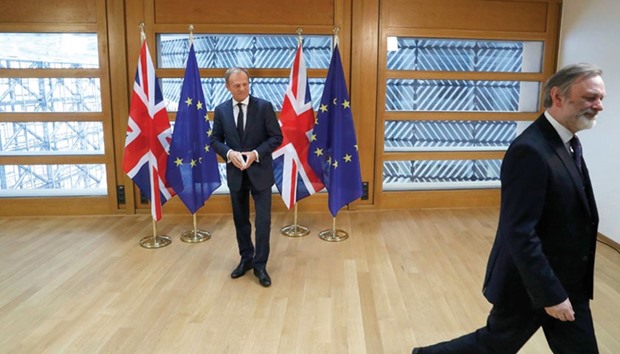Prime Minister Theresa May formally began Britain’s divorce from the European Union yesterday, declaring there was no turning back and ushering in a tortuous exit process that will test the bloc’s cohesion and pitch her country into the unknown.
In one of the most significant steps by a British leader since World War II, May notified EU Council president Donald Tusk in a hand-delivered letter that Britain would quit the club it joined in 1973.
“The United Kingdom is leaving the European Union,” May told parliament nine months after Britain shocked investors and world leaders by unexpectedly voting to quit the bloc. “This is an historic moment from which there can be no turning back.”
The prime minister, an initial opponent of Brexit who won the top job in the political turmoil that followed the referendum vote, now has two years to negotiate the terms of the divorce before it comes into effect in late March 2019.
May, 60, has one of the toughest jobs of any recent British prime minister: holding Britain together in the face of renewed Scottish independence demands, while conducting arduous talks with 27 other EU states on finance, trade, security and other complex issues.
The outcome of the negotiations will shape the future of Britain’s $2.6tn economy, the world’s fifth biggest, and determine whether London can keep its place as one of the top two global financial centres.
For the EU, already reeling from successive crises over debt and refugees, the loss of Britain is the biggest blow yet to 60 years of efforts to forge European unity in the wake of two world wars.
Its leaders say they do not want to punish Britain.
But with nationalist, anti-EU parties on the rise across Europe, they cannot afford to give London generous terms that might encourage other member states to break away.
May’s notice of the UK’s intention to leave the bloc under Article 50 of the EU’s Lisbon Treaty was hand-delivered to Tusk in Brussels by Tim Barrow, Britain’s permanent representative to the EU, on the top floor of the new Europa Building in Brussels, according to a Reuters photographer in the room.
That moment formally set the clock ticking on Britain’s two-year exit process.
The sterling, which has lost 25 cents against the dollar since the June 23 referendum, jumped to $1.25.
May signed the six-page Brexit letter on Tuesday night, pictured alone at the Cabinet table beneath a clock, a British flag and an oil-painting of Britain’s first prime minister, Robert Walpole.
Her letter sought to set a positive tone for the talks though it admitted that the task of extracting the UK from the EU was momentous and that reaching comprehensive agreements within two years would be a challenge.
May wants to negotiate Britain’s divorce and the future trading relationship with the EU within the two-year period, though EU officials say that will be hard given the depth of the relationship.
“We believe it is necessary to agree the terms of our future partnership alongside those of our withdrawal from the EU,” May told Tusk in her letter, adding that London wanted an ambitious free trade agreement with the EU.
“If, however, we leave the European Union without an agreement the default position is that we would have to trade on World Trade Organisation terms,” she said.
May has promised to seek the greatest possible access to European markets but said Britain was not seeking membership of the ‘single market’ of 500mn people as she understood there could be no “cherry picking” of a free trade area based on unfettered movement of goods, services, capital and people.
Britain will aim to establish its own free trade deals with countries beyond Europe, and impose limits on immigration from the continent, May has said.
In an attempt to start Brexit talks on a conciliatory note, May said she wanted a special partnership with the EU though she laced that ambition with a clear linkage of the economic and security relationship.
EU leaders will welcome assurances of a constructive approach and appreciate a commitment to remain a close partner for the EU and to encourage its development, as well as an explicit recognition that Britain cannot retain the best bits of membership after leaving.
They may be less warm to an implication that Britain could live with a breakdown of talks on trade coupled with what might be seen as a threat to disrupt the security and counterterrorism co-operation for which Britain, as a member of the US-backed Anglophone Five Eyes system, is highly valued.
“We should work together to minimise disruption and give as much certainty as possible,” May said. “Weakening our co-operation for the prosperity and protection of our citizens would be a costly mistake.”
Tusk said the EU would seek to minimise the cost of Brexit to EU citizens and businesses and that Brussels wanted an orderly withdrawal for Britain.
“We already miss you,” said Tusk who will send the 27 other states draft negotiating guidelines within 48 hours. “Thank you and goodbye.”
The course of the Brexit talks — and even their scope — is uncertain.

Britain’s permanent representative to the European Union, Tim Barrow, leaves after he delivers Prime Minister Theresa May’s Brexit letter to EU Council president Donald Tusk in Brussels, Belgium, yesterday.
